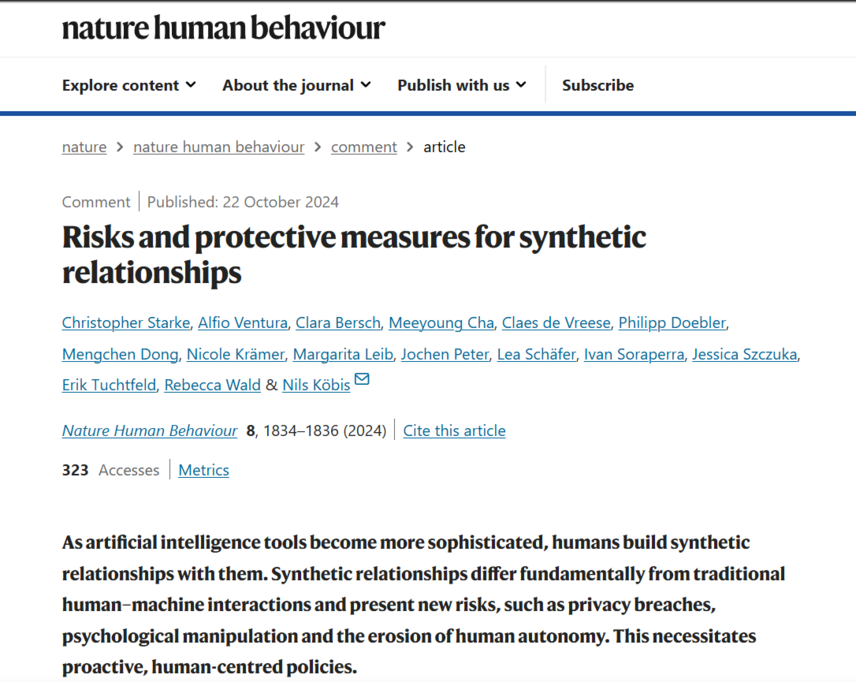03.11.2024
The study is realised by many researchers from RCTrust! It deals with the risks and polices of synthetic relationships.

Abstract:
It deals with the risks and polices of synthetic relationships As artificial intelligence tools become more sophisticated, humans build synthetic relationships with them. Synthetic relationships differ fundamentally from traditional human–machine interactions and present new risks, such as privacy breaches, psychological manipulation and the erosion of human autonomy. This necessitates proactive, human-centred policies.
Authors:
- Christopher Starke (Amsterdam School of Communication Research, University of Amsterdam)
- Alfio Ventura (Research Center Trustworthy Data Science and Security, University of Duisburg-Essen)
- Clara Bersch (Center for Humans and Machines, Max Planck Institute for Human Development, Berlin and Max Planck School of Cognition, Leipzig)
- Meeyoung Cha (Data Science for Humanity, Max Planck Institute For Security and Privacy, Bochum and Korea Advanced Institute of Science and Technology, Daejeon, South Korea)
- Claes de Vreese (Amsterdam School of Communication Research, University of Amsterdam)
- Philipp Doebler (Department of Statistics, TU Dortmund University, Dortmund and Research Center Trustworthy Data Science and Security)
- Mengchen Dong (Center for Humans and Machines, Max Planck Institute for Human Development, Berlin)
- Nicole Krämer (Research Center Trustworthy Data Science and Security, University of Duisburg-Essen, Duisburg)
- Margarita Leib (Tilburg School of Social and Behavioral Sciences, Tilburg University, Tilburg)
- Jochen Peter (Amsterdam School of Communication Research, University of Amsterdam)
- Lea Schäfer (Charité Berlin, Department of Psychiatry and Neurosciences, CCM, Berlin)
- Ivan Soraperra (Center for Humans and Machines, Max Planck Institute for Human Development, Berlin)
- Jessica Szczuka (Research Center Trustworthy Data Science and Security, University of Duisburg-Essen, Duisburg)
- Erik Tuchtfeld (humanet3 Research Group, Max Planck Institute for Comparative Public Law and International Law, Heidelberg)
- Rebecca Wald (Amsterdam School of Communication Research, University of Amsterdam, Amsterdam)
- Nils Köbis (Research Center Trustworthy Data Science and Security, University of Duisburg-Essen, Duisburg and Center for Humans and Machines, Max Planck Institute for Human Development, Berlin)
More information here: Link to the paper.
Category
- Publication